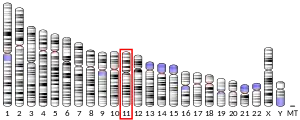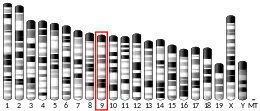RNF26
Ring finger protein 26 is a protein that in humans is encoded by the RNF26 gene. [5]
| RNF26 | |||||||||||||||||||||||||||||||||||||||||||||||||||
|---|---|---|---|---|---|---|---|---|---|---|---|---|---|---|---|---|---|---|---|---|---|---|---|---|---|---|---|---|---|---|---|---|---|---|---|---|---|---|---|---|---|---|---|---|---|---|---|---|---|---|---|
| Identifiers | |||||||||||||||||||||||||||||||||||||||||||||||||||
| Aliases | RNF26, ring finger protein 26 | ||||||||||||||||||||||||||||||||||||||||||||||||||
| External IDs | OMIM: 606130 MGI: 2388131 HomoloGene: 12924 GeneCards: RNF26 | ||||||||||||||||||||||||||||||||||||||||||||||||||
| |||||||||||||||||||||||||||||||||||||||||||||||||||
| |||||||||||||||||||||||||||||||||||||||||||||||||||
| |||||||||||||||||||||||||||||||||||||||||||||||||||
| |||||||||||||||||||||||||||||||||||||||||||||||||||
| |||||||||||||||||||||||||||||||||||||||||||||||||||
| Wikidata | |||||||||||||||||||||||||||||||||||||||||||||||||||
| |||||||||||||||||||||||||||||||||||||||||||||||||||
Function
The protein encoded by this intronless gene contains a C3HC5 type of RING finger, a motif known to be involved in protein-DNA and protein-protein interactions. The expression of this gene was found to be upregulated in cancer cell lines derived from different types of cancer. [provided by RefSeq, Jul 2008].
References
- GRCh38: Ensembl release 89: ENSG00000173456 - Ensembl, May 2017
- GRCm38: Ensembl release 89: ENSMUSG00000053128 - Ensembl, May 2017
- "Human PubMed Reference:". National Center for Biotechnology Information, U.S. National Library of Medicine.
- "Mouse PubMed Reference:". National Center for Biotechnology Information, U.S. National Library of Medicine.
- "Entrez Gene: Ring finger protein 26". Retrieved 2013-07-15.
Further reading
- Katoh M (April 2001). "Molecular cloning and characterization of RNF26 on human chromosome 11q23 region, encoding a novel RING finger protein with leucine zipper". Biochemical and Biophysical Research Communications. 282 (4): 1038–44. doi:10.1006/bbrc.2001.4671. PMID 11352657.
This article incorporates text from the United States National Library of Medicine, which is in the public domain.
This article is issued from Wikipedia. The text is licensed under Creative Commons - Attribution - Sharealike. Additional terms may apply for the media files.



